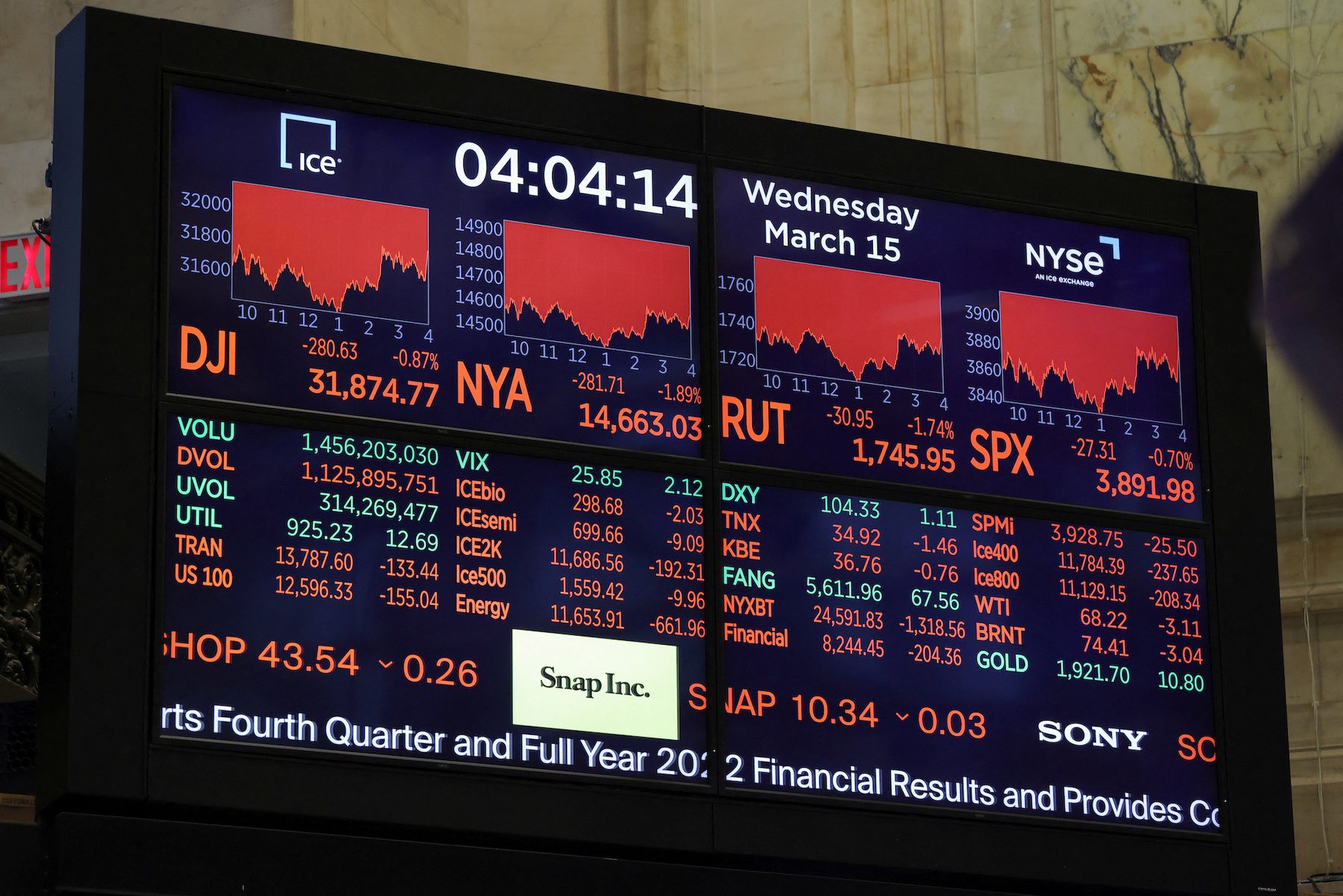SUMMARY
This is AI generated summarization, which may have errors. For context, always refer to the full article.

Renewed unease gripped world markets on Wednesday, March 15, as news that Credit Suisse’s largest investor said it could not provide the Swiss bank with more financial assistance sent its shares and broader global equities sliding.
US inflation data showed signs of economic weakness and cooling inflation.
Yields on US Treasuries and eurozone bonds tumbled on renewed turmoil in banking stocks and shifting interest rate expectations. Gold prices renewed their recent rally as investors sought safe havens.
Oil prices plunged more than $5 a barrel to their lowest in more than a year.
Concern over further banking sector instability and closely watched inflation data published on Wednesday raised expectations the Federal Reserve may pause or slow down hiking rates.
Credit Suisse shares tumbled 24.2%, falling below 2 Swiss francs ($2.18), after the lender’s biggest shareholder said it could not raise its stake beyond 10%, citing regulatory issues. US-listed shares of Credit Suisse hit a record low.
“The question that is in everyone’s mind is: are we headed for another financial crisis?” said Brad McMillan, chief investment officer for Commonwealth Financial Network in Waltham, Massachusetts. “That’s what’s driving the bus at the moment.”
The Dow Jones Industrial Average fell 280.83 points, or 0.87%, to 31,874.57; the S&P 500 lost 27.36 points, or 0.70%, at 3,891.93; and the Nasdaq Composite gained 5.90 points, or 0.05%, at 11,434.05.
Banking stocks plummeted, with big US banks including JPMorgan Chase & Co., Citigroup, and Bank of America pushing the S&P 500 banking index down 3.62%. The KBW regional banking index declined 1.57%.
The MSCI world equity index, which tracks shares in 49 nations, lost 1.34%.
Signs of calm and stability in banking stocks, which have tanked in the past week following the collapse of Silicon Valley Bank (SVB), gave way to renewed selling as Credit Suisse shares fell to record lows.
The pan-European STOXX 600 index closed the day 3% lower, a day after recording its best day this year.
Investors rushed back into safe haven investments. Germany’s 2-year yield dropped 51 basis points (bps) to 2.419%, putting it on course for its biggest daily fall since 1995.
The yield on benchmark 10-year Treasury notes fell to 3.4623% from a previous close of 3.636%. The 2-year yield, which rises with traders’ expectations of higher fed fund rates, touched 3.8916% compared with a previous close of 4.225%.
US gold futures gained 1.1% to settle at $1,931.30. Spot prices were last up 0.84% at $1,918.04 an ounce at 4:46 pm EDT (2046 GMT).
“The Credit Suisse share price is falling and government bonds are rallying on the back of that. Still very much driven by the perceived health of the banking sector, but this time in Europe,” said Antoine Bouvet, senior rates strategist at ING.
The European Central Bank is still leaning towards a half-percentage-point rate hike on Thursday, March 16, despite turmoil in the banking sector, given high inflation, a source close to its Governing Council told Reuters.
MSCI’s broadest index of Asia-Pacific shares outside Japan rose 0.6%, having slid 1.7% on Tuesday, March 14. Japan’s Nikkei index was flat while an index of Japanese banks, which has slid 8% this week, jumped over 3%.
As recently as last week, markets braced for the return of large Fed interest rate rises but the swift collapse of SVB has changed those expectations. Traders now expect equal chances of a 25-bps rate hike and a pause at the Fed’s March meeting.
Retail sales dropped 0.4% last month, the US Department of Commerce said on Wednesday, largely in line with expectations. January data was revised higher to show growth of 3.2% instead of 3% as previously reported.
“The real takeaway here for the Fed meeting is that while the inflation problem is not solved, does the Fed say they have more immediate problems,” McMillan said. “They will probably go with 25 basis points but I wouldn’t be shocked to see them go flat.”
The euro was 1.5% weaker on the day at $1.0575, having lost 0.01% in a month, while the dollar index, which tracks the greenback against a basket of currencies of other major trading partners, was up at 104.74.
In commodities, both crude benchmarks hit their lowest since December 2021 and have fallen for three straight days. Brent crude, the global benchmark, settled down $3.76, or 4.9%, at $73.69 a barrel.
US West Texas Intermediate crude was down $3.72, or 5.2%, at $67.61, breaking through technical levels of $70 and $68 and extending the sell-off. – Rappler.com
$1 = 0.9443 euros
Add a comment
How does this make you feel?
There are no comments yet. Add your comment to start the conversation.